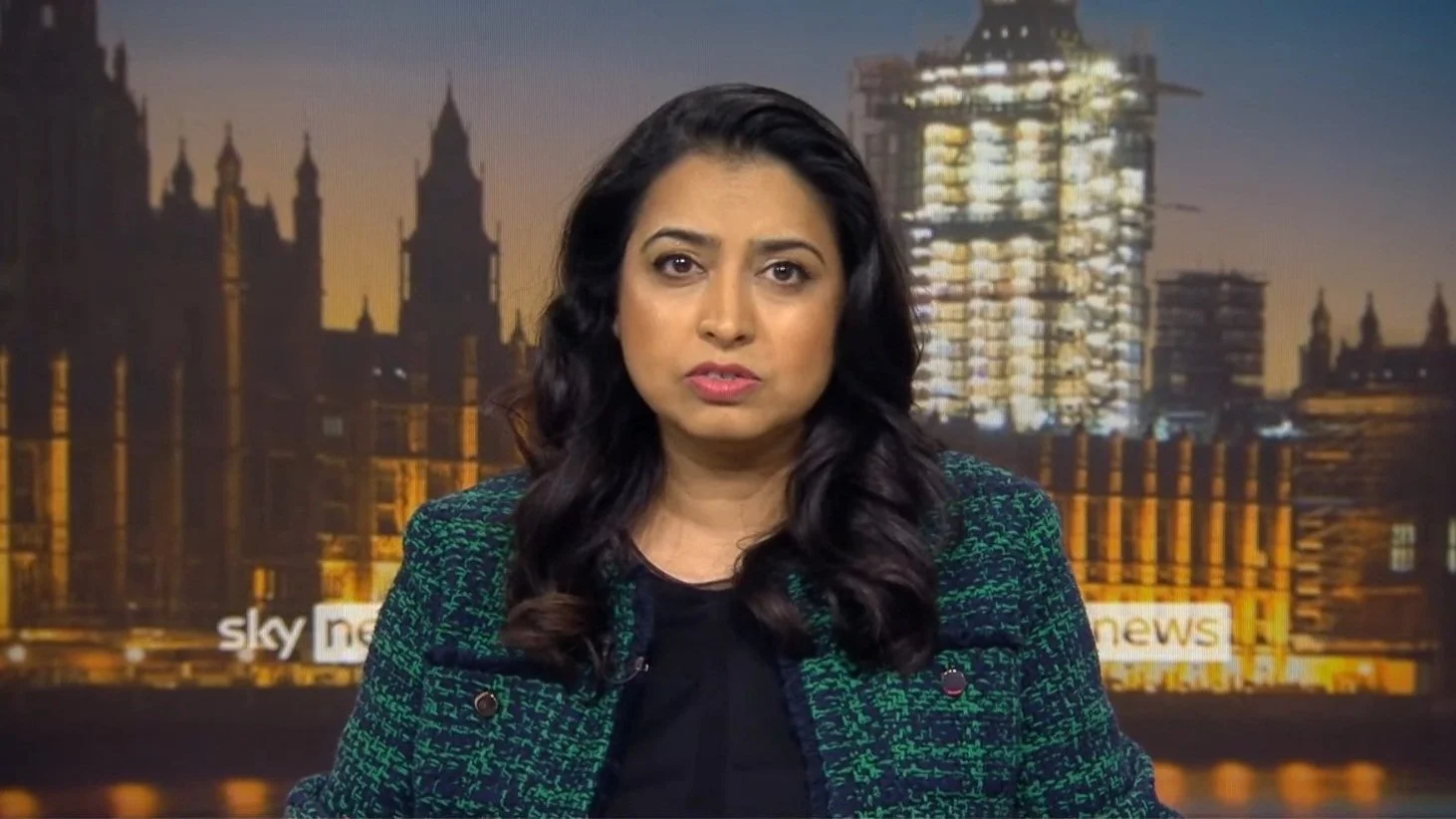United Kingdom: Saima Mohsin Sues CNN For Discrimination And Unfair Dismissal After Injury On The Job
The Coalition For Women In Journalism stands in solidarity with the veteran journalist. Urges the court to rule in her favor.
Location: United Kingdom, London
Date: July 10, 2023**Updated on August 18, 2023.
British presenter and international correspondent Saima Mohsin is taking legal action against CNN in the UK for mistreatment after a serious injury on the job, racial discrimination, and unfair dismissal. The case raises important questions about journalist safety, the treatment of women of color in journalism, and the ability of foreign correspondents to receive appropriate healthcare and support after being injured on assignment. The Coalition For Women In Journalism supports Mohsin’s decision to take legal action and urges the Employment Tribunal in London to draw judgment intuitively.
“I risked my life many times on assignment for CNN, believing they would have my back. They did not.” says well-known British Pakistani journalist Saima Mohsin as she announced she is suing CNN in the UK.
“I risked my life many times on assignment for CNN believing they would have my back. They did not”
The CFWIJ has been aware of multiple ordeals the journalist has gone through since her injury and notes with regret that she was not supported by the organization deservingly.
“Journalists, women, colored or otherwise, take great risks to be on the frontline of a very precarious world that needs coverage. When CNN says we 'Go There,’ it is their correspondents who are risking their lives to be on the frontline. It is the utmost responsibility of a news organization to protect its reporters and support them in times of injury and crises on the job. CNNs lack of support towards Saima is an atrocious treatment in return for the service she provided as a reporter putting her life on the line covering conflict in the Middle East when she got injured. This is worrying for all journalists who take great risks to bring on the frontlines at a time when it's critically difficult to do this job. There is no journalism without a journalist who is safe and supported by their employers.” says Kiran Nazish, the founding director of CFWIJ.
Mohsin submitted a complaint to the Employment Tribunal claiming unfair dismissal and discrimination based on race, disability, and gender in 2018. The first hearing will take place in London on Monday.
The journalist told CFWIJ she hopes her decision to take legal action will shed light on the serious issue of challenges women and journalists of color face in the UK.
“I’m doing this to take a stand - for the protection of all journalists working internationally, who like me, risk their lives for our platforms and to ensure women like me are treated as equals. If not now, when?”
Mohsin also explicitly tells the CFWIJ, “I’m doing this to take a stand - for the protection of all journalists working internationally, who like me, risk their lives for our platforms and to ensure women like me are treated as equals. If not now, when?”
Mohsin - a lauded journalist with a successful career working for major news networks - was working as a foreign correspondent for CNN UK when her life took a drastic turn. While reporting on the Israel-Palestine conflict in 2014 she suffered a debilitating injury. Her cameraman drove over her foot in a jeep, crushing her foot and leaving her with extensive soft tissue damage and a crippling neuropathic pain condition.
“We have been in the loop with Saima Mohsin after the injury and have witnessed her trying to resolve this issue with CNN for years on end while suffering from the physical and emotional pain for years. It is very clear to us that Saima has been treated unfairly and uncompassionately. This is concerning for us because if a remarkable and bold journalist like her can be treated this way, it raises questions about the treatment of all journalists who work for the media company who are sent for assignments,” adds Kiran Nazish.
“If a remarkable and bold journalist like her can be treated this way, it raises questions about the treatment of all journalists who work for the media company who are sent for assignments”
Following her injury, Mohsin continued to work as a foreign correspondent. Due to persistent pain, she repeatedly requested alternative duties and support for rehabilitation to adjust to her disability, but CNN repeatedly refused.
Then, while on medical leave in 2017, CNN terminated her contract.
Discrimination claims
Moshin says after her injury, she asked if she could switch to presenting to reduce her time on the road. She was told, “You don’t have the look we are looking for.”
In her time at the network, Mohsin faced continuous obstacles in her pursuit of high-profile on-air opportunities. Despite her efforts, Saima says, her pitches were often given to other correspondents.
She recalls an incident where she was left standing ready to present an in-country live shot when managers decided to go with a white American correspondent instead, who was neither present nor as capable of effectively reporting on the event.
While Saima was aware of the gender and ethnicity pay gap issues in the company, she was shocked to discover the stark difference in her pay compared to her colleagues at CNN, despite her extensive experience.
Although she did raise these concerns during her tenure, she feared jeopardizing her job and her income.
“I’m also taking the opportunity to highlight the racism and gender pay gap issues that I experienced,” says Mohsin. “I was repeatedly let down and denied the ability to achieve my potential while I was at CNN. I am bringing my claim to take a stand and call for change to ensure women journalists, and women journalists of color, are better protected.”
CNN denies Mohsin's claims and is contesting her right to seek justice in the UK, arguing that the Employment Tribunal does not have jurisdiction over her case. This argument raises an important concern for foreign correspondents, as it questions where they can seek justice and redress if they encounter disputes with their employer.
On August 15, 2023, Mohsin was granted permission to take the news network to an employment tribunal in the UK over claims of unfair dismissal and discrimination. Judge Klimov ruled in Mohsin's favor, allowing her case to proceed to a full tribunal at the London Central Employment Tribunal.
Gender pay gap and race discrimination in UK media
A report released in 2022 uncovered a "culture of exclusion" that is leading to the underrepresentation of women of color in top media positions and the marginalization of their perspectives in news coverage. In the UK, the report found that not a single woman of color held a senior editorial position in politics, foreign affairs, or health news.
In 2020, presenter Samira Ahmed won her equal pay claim against the BBC in a landmark case. Ahmed argued that she was owed almost £700,000 in back pay due to the difference between her £440-an-episode rate and the £3,000-an-episode rate that colleague Jeremy Vine received for hosting a similar program. The Employment Tribunal unanimously concluded that the BBC had failed to provide convincing evidence that the pay gap was not due to gender discrimination.
After her termination from CNN, Saima experienced a breakdown and depression, undergoing extensive physiotherapy to regain control of her foot. Despite her struggles, Mohsin has become an advocate for those living with invisible disabilities, using her platform to raise awareness and fundraise for the disability charity Scope. She is now a freelance presenter on Sky News.
“Saima has gone through an excruciating ordeal since her injury at the West Bank on this CNN assignment. We recognize that at least half of her suffering has been beyond the pain from her physical injury. Her life halted after being mistreated by CNN, which is deeply concerning as we see women and women of color, in particular, being disregarded for their enormous contributions to big media organizations. This mistreatment of women of color in the media needs to stop immediately,” says Kiran Nazish.
“Saima is taking action against CNN not only as a fight for dignity for herself but also for all women and women of color in the industry”
Mohsin’s case highlights the challenges faced by women journalists, particularly journalists of color, and the need for greater protection and equality within the industry. It also brings attention to the challenges faced by foreign correspondents in accessing appropriate healthcare and employment protection. The Coalition For Women In Journalism applauds Saima Mohsin for taking legal action and urges the Employment Tribunal to judge in her favor.
Nazish adds, “Witnessing Saima’s patience over the years, I can say confidently that Saima is taking action against CNN not only as a fight for dignity for herself but also for all women and women of color in the industry, who are treated with neglect and often expected to pay the price quietly. There is no doubt that Saima is undertaking a selfless act, and she has our full support.”
The Coalition For Women In Journalism is a global organization of support for women journalists. The CFWIJ pioneered mentorship for mid-career women journalists across several countries around the world and is the first organization to focus on the status of free press for women journalists. We thoroughly document cases of any form of abuse against women in any part of the globe. Our system of individuals and organizations brings together the experience and mentorship necessary to help female career journalists navigate the industry. Our goal is to help develop a strong mechanism where women journalists can work safely and thrive.
If you have been harassed or abused in any way, and please report the incident by using the following form.








